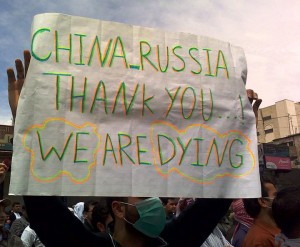 Russia and China on Saturday vetoed a Security Council resolution backing an Arab League peace plan that calls for Syrian President Bashar Assad to step down amid escalating violence.
Russia and China on Saturday vetoed a Security Council resolution backing an Arab League peace plan that calls for Syrian President Bashar Assad to step down amid escalating violence.
The other 13 members of the council, including the United States, Britain and France, voted in an unusual weekend session favor of the resolution aimed at stopping the ongoing violence in Syria.
The rare double-veto was issued following days of negotiations aimed at overcoming Russian opposition to the draft resolution. Several European envoys said before the session that they felt compelled to call for the vote despite Russia’s attempts to seek a delay because of the escalating violent crackdown by Assad’s regime.
The urgency was heightened by an assault by Syrian forces firing mortars and artillerey on the city of Homs. Activists said more than 200 people were killed in what they called one of the bloodiest episodes of the uprising against Assad. The U.N. says more than 5,400 people have been killed over almost 11 months in a government crackdown on civilian protests.
“It is a sad day for this council, a sad day for Syrians and a sad day for all friends of democracy,” French Ambassador Gerard Araud said after the resolution was vetoed.
U.S. Ambassador Susan Rice said her country was “disgusted” by the vote.
Araud said Russia and China had “made themselves complict in a policy of repression carried out by the Assad regime.”
Syria has been a key Russian ally since Soviet times and Moscow has opposed any U.N. call that could be interpreted as advocating military intervention or regime change. Russia and China also used their veto powers as permanent council members in October to block a previous Western attempt to condemn the violence in Syria.
“Today the Security Council has failed to live up to its responsiblty,” German Ambassador Peter Wittig said. “The people in Syria have been let down again.”
Earlier Saturday, Russian Foreign Minister Sergey Lavrov said at a security conference in Munich, Germany, that Moscow still two problems of “crucial importance” with the draft council resolution on the violence in Syria.
Lavrov said the resolution makes too few demands of anti-government armed groups, and that Moscow remains concerned that it could prejudge the outcome of a national dialogue among political forces in Syria.
Lavrov was quoted by Russian news agencies as saying that he and Russia’s foreign intelligence chief, Mikhail Fradkov, will meet with Assad in Damascus on Tuesday.
Before the vote, President Barack Obama urged the council to take a stand against Assad’s regime and back the resolution.
“The international community must work to protect the Syrian people from this abhorrent brutality,” Obama said in a statement issued by the White House.
In a blistering statement, Obama said Assad had displayed “disdain for human life and dignity” following the weekend attacks in Homs.
“The Syrian regime’s policy of maintaining power by terrorizing its people only indicates its inherent weakness and inevitable collapse,” Obama said. “Assad has no right to lead Syria, and has lost all legitimacy with his people and the international community.”
To the Syrian people, Obama pledged U.S. support and vowed to work with them to build a better future in their country.
Secretary of State Hillary Rodham Clinton met Saturday with Lavrov on the sidelines of the security conference to stress that the United States strongly believes the council should vote on the resolution Saturday, a senior State Department official said.
The official, speaking on condition of anonymity because of the sensitivity of the matter, said they had a “very vigorous discussion.”
In an interview broadcast earlier Saturday on Russian state television, Lavrov had warned that Moscow would use its veto power if several amendments it had submitted were not included in the European-Arab draft of the resolution.
“If they want another scandal at the U.N. Security Council, we wouldn’t be able to stop them,” Lavrov said, voicing hope that Washington wouldn’t put the draft to a vote without Russia’s amendments.
“The scandal is not to act. The scandal would be to fail to act,” Wittig, the German ambassador, said before Saturday’s session.
Russian news agencies quoted Lavrov upon his return to Moscow later Saturday as saying that the amendments were not “excessive” and that consensus on the resolution remained possible “if our colleagues show a constructive approach.”
But U.S. Ambassador Rice told reporters as she headed into the council session that Russia’s proposed amendments were “unacceptable.”
Foreign Minister Alain Juppe of France, a firm backer of U.N. action and also a permanent Security Council member, said the latest outbreak of violence in Syria “underlines the urgency that the U.N. Security Council must break its silence to denounce the authors of this crime.”
“The international community must recognize and support the right of the Syrian people to freedom, to security and to the choice of its political future,” Juppe said. “Those who block the adoption of such a resolution are taking a grave historical responsibility.”
AP

Leave a Reply
You must be logged in to post a comment.